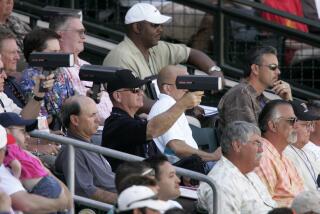Judge to Order Boy Scouts to Readmit Atheist Twins; Appeal Planned : Courts: Randall boys’ excitement at donning uniforms officially is tempered by probability of further litigation.
- Share via
SANTA ANA — Their old Cub Scout uniforms were getting too tight and were showing their age, so 10-year-old twins Michael and William Randall went and bought themselves brand spanking new ones.
And when a judge ruled Monday that the brothers, forced out of the Cub Scouts because they do not believe in God, can now rejoin the organization, the boys pranced around, proudly displaying their new outfits.
“Now, it’s real! Wearing my uniform will make it real that I’m going to be a Boy Scout again,” exclaimed William Randall. “I can’t wait to put it on and have my merit badges put on as well.”
Not so fast, boys.
Even as Superior Court Judge Richard O. Frazee Sr. announced that he will sign a judgment today ordering enforcement of his May ruling that the boys be admitted back into Scouting, Scout officials grimly vowed that they will file an appeal.
Frazee had ruled that the Boy Scouts is a business enterprise under state law and cannot discriminate on the basis of religion. Therefore, the judge had ruled, the twins who were kicked out of Scouting when they refused to say the word “God” in the Scouting oath must be allowed to rejoin.
Attorneys for the Scouts have argued that the organization is a private association and membership is selected. They claimed Frazee’s interpretation of the law is wrong.
Once the Boy Scouts of America has filed its appeal--which is expected to happen within the next two days--attorneys for both sides predict that the 4th District Court of Appeal will issue a stay against Frazee’s ruling, meaning the boys’ Scouting activities will once again be shelved until that court issues its own ruling.
And whatever decision the appeals court makes will be challenged in the higher courts, both sides promised.
“We’ll go as far as we have to,” said James G. Randall, the boys’ father and attorney. “But, at this rate, it looks as if my boys will be grown adults and married with children by the time this case is decided.
“I sure wish this matter could be resolved; it should have been resolved, but it will never be resolved and the only people hurt are the two children,” Randall said.
Randall added that he had told Scouts officials that, as a compromise, he would not press for the court and attorney fees that he might ultimately be awarded if his sons could once again participate in Scouting--without conditions. His offer was flatly refused.
“The duty to God is very important to Boy Scouts of America and they feel it’s important enough to fight (this case) and important enough not to compromise,” said John C. Kralik, attorney for Orange County Council, Boy Scouts of America.
Meanwhile, the twins said they have been told about, and are prepared for, the continuing battle with Scouting’s national organization. If nothing else, they can now officially don their uniforms--even if it’s only for a day or two.
“If the stay is granted, it will probably take two days for us to know about it,” said William Randall. “I’m going to wear the uniform to this week’s meeting and be proud of it because I fought for the right to wear it.”
Since Frazee’s May ruling, the brothers have been attending Scout meetings at an undisclosed den as honorary members only.
“We’re still guests because we’re not in our uniforms,” said Michael. “I just feel like I’m off to the sideline watching (uniformed Cub Scouts) play.”
The Randall case started in January, 1991, when William and Michael’s den mother discovered that the boys did not swear an oath to God. They were told that they couldn’t advance in rank without fulfilling a religious requirement and were ultimately excluded from the organization.
James Randall subsequently filed a lawsuit on behalf of his sons seeking their reinstatement. He argued that under the U.S. Constitution, “freedom of religion” includes the freedom not to practice religion. But his victory came under anti-discrimination provisions of state commercial laws, which he argued the Scouts were subject to because they sold Scouting items for a profit and operated profitable outlets in California.

